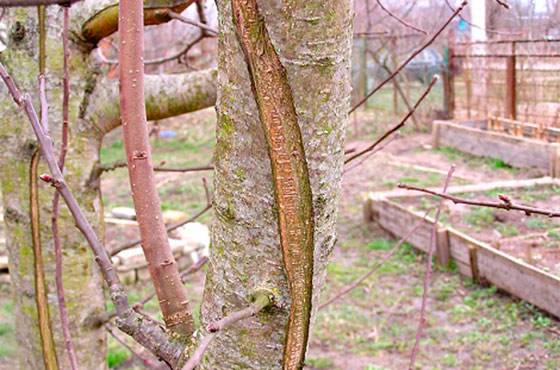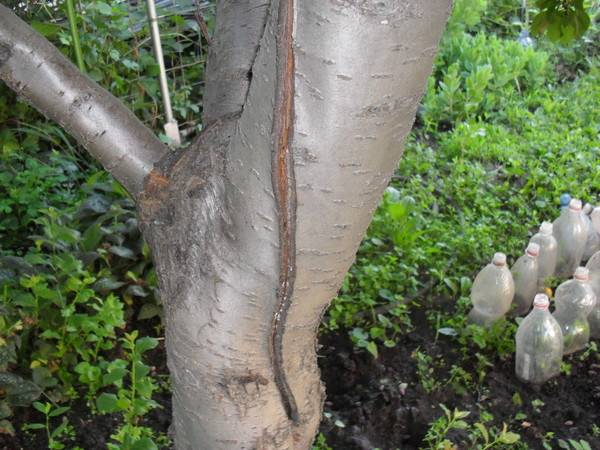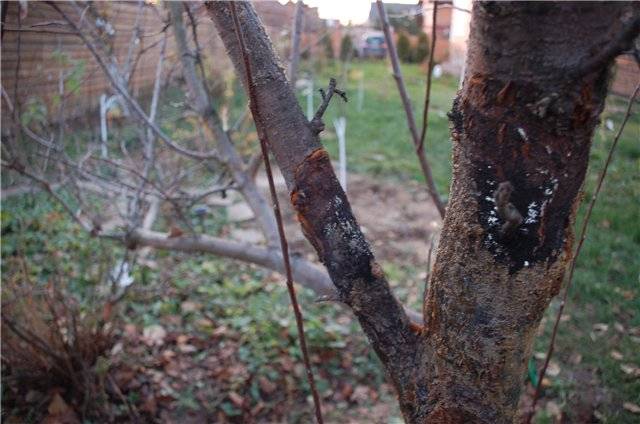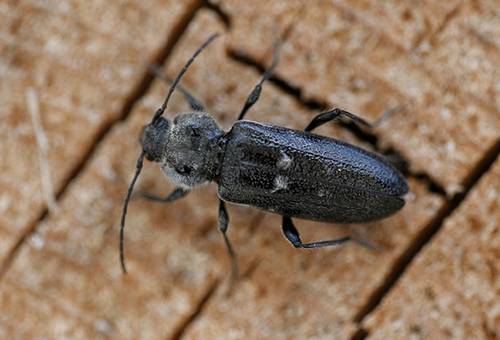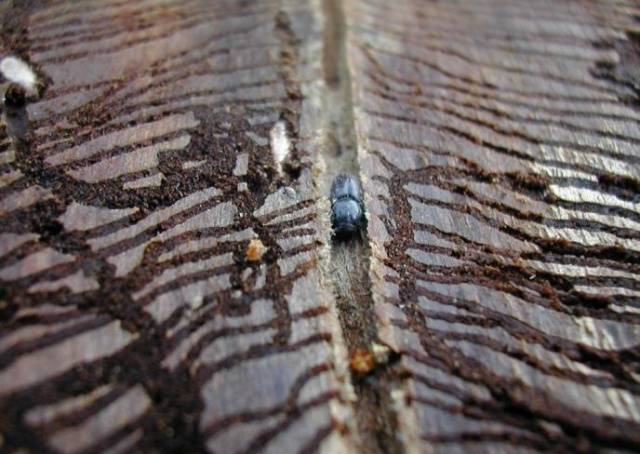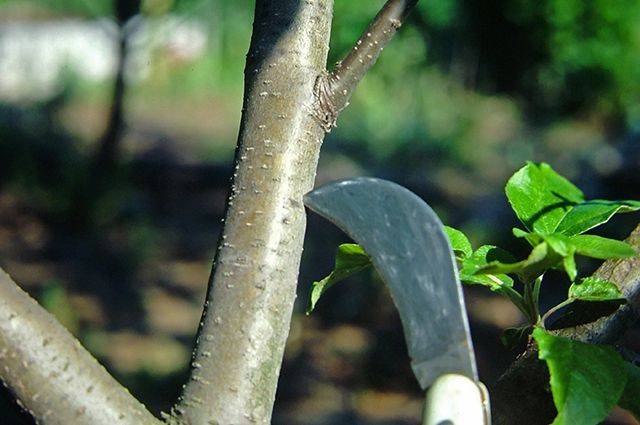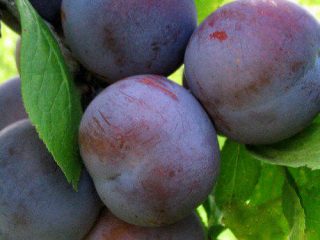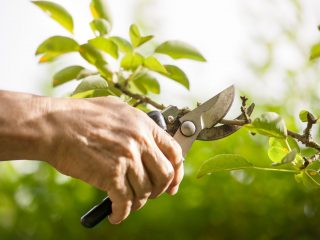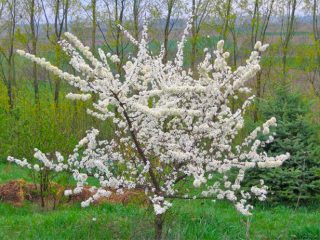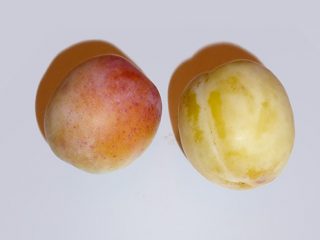Content
- 1 Why does the bark crack on the plum
- 1.1 Why does the plum bark crack on the trunk: determine the reasons
- 1.2 Why are cracks on the bark of a plum dangerous?
- 1.3 Treatment of diseases, cracks and swelling of the plum trunk
- 1.4 What to do if the bark burst on the drain due to frost
- 1.5 Black cancer - the cause of cracks in plum trunks
- 1.6 The bark burst on the plum due to rapid growth: what to do
- 1.7 What to do if the bark on the plum cracks due to pests
- 2 Why did the plum trunk crack?
- 3 Prevention of cracking of bark and plum trunks
- 4 Conclusion
For many summer residents, sooner or later, the bark cracks on the drain. This is a fairly common problem that can cause significant harm to the health of the tree, lead to withering too early or even death.
To overcome the disease, first of all, it is necessary to identify the reason why a crack has appeared on the plant, and only then take treatment measures.
Why does the bark crack on the plum
There are many factors that can influence the appearance of cracks in the bark of a plum. The main step in the tree treatment phase is to identify these factors in order to take timely action.
Why does the plum bark crack on the trunk: determine the reasons
There are several reasons that can provoke cracks in the bark of a plum:
- The tree is growing too fast.
- Very coldy.
- Pests.
- Plant diseases.
- Excessive harvest.
- Excessive fertilization of the soil.
- Sunburn in the summer.
- Damage during trimming.
- Rodents.
Why are cracks on the bark of a plum dangerous?
Cracks cause significant damage to plum trees, as they become a haven for various microbes, viruses and bacteria that provoke plant diseases.
A tree crack on the trunk resembles a wound on the skin of a person: if you do not take appropriate treatment measures in time, it will begin to grow and multiply the infection.
To save the tree and preserve the harvest, it is necessary to take prompt measures to treat the plant.
Treatment of diseases, cracks and swelling of the plum trunk
A fairly common cause of cracks in the plum tree is the presence of diseases. In this case, it is necessary to wash the affected bark with a stiff brush and burn it. The remaining wounds on the trunk are treated with a garden varnish.
Also, sewage can cause illness. To eliminate the problem, they must be taken as far as possible from the plum trunk.
If the bark of a tree swells and bursts, you need to prepare a solution, which includes a package of iron sulfate. You just need to dilute it in a container with warm water and bring it to the state of liquid sour cream.
It is necessary to process the exfoliated bark with this solution. And in late spring or early summer, a similar procedure should be carried out on wounds after removing the affected areas.
What to do if the bark burst on the drain due to frost
Frost is the most common cause of plum bark cracks. This problem can be explained by the elementary law of physics about the expansion of water (in this case, we are talking about the juice that is on the trunk). When the liquid freezes, the crust is unable to cope with the pressure of the ice.
In the daytime, the tree is exposed to sunlight and then freezes again at night. Such temperature differences and constant pressure of the frozen liquid lead to a weakening of the crust and the appearance of cracks on it.
To solve this problem, you need to make a weak solution of potassium permanganate and handle the crack with it.
Video about the treatment of frostbites on fruit trees:
Black cancer - the cause of cracks in plum trunks
If the gardener noticed that the plum is no longer yielding, and its branches begin to dry out and shed their foliage, there is a possibility that the plant is affected by black crayfish. In addition to these symptoms, the bark of the tree begins to darken, fungal cracks appear on it.
Plum can undergo black cancer if;
- Do not take care of trees.
- Do not protect the site from winds.
- Plant a tree next to the toilet.
- Use too much fertilizer.
- Place the compost pit near the plant.
Despite the severity of the disease, plums can be cured by starting to fight black cancer in its initial period. There are the following plant rescue methods:
- On a sunny day, when there is no strong wind, place a thick cloth or paper around the plum stem.
- Disinfect cracks with potassium permanganate solution or copper sulfate solution.
- Gently scrub off any loose bark using a stiff brush.
- With the help of a special garden knife, completely get rid of the affected capillary tissue of the plum. It is also necessary to capture about 3 cm of healthy tissue.
- Disinfect the area where the procedure was carried out with preparations containing copper.
- Apply garden varnish to the already treated parts of the bark and cover them with a cloth.
- Burn all remaining bark, foliage, fruits and branches of the plum.
- Till the soil around the tree.
The bark burst on the plum due to rapid growth: what to do
The sudden and rapid growth of the plum tree causes cracks in its bark. Despite the fact that the outer tissue of this plant is quite elastic, excessive growth still leads to similar problems. This is due to the strong pressure that the tree trunk exerts on the bark as it grows.
Typically, this problem is caused by over fertilizing the soil around the plum tree or having a toilet next to it. To prevent it, it is necessary to comply with the norms for the introduction of substances that increase the yield, and also not to place the tree near the place for the fulfillment of natural needs.
If crevices do appear, they need to be treated with garden varnish.
What to do if the bark on the plum cracks due to pests
To determine how badly the plum is affected by pests, you need to poke the bark with a knife. If it can be easily pierced and torn from the trunk, the tree must be cut down and destroyed by fire. But if the bark is still hard, there is a chance that the plants will be rescued by chemical treatments.
Woodworms
Woodworms are usually found inside the tree. Very often they are only recognized when small holes have already appeared on the drain. If these pests are found on the plant, it is necessary to resort to one of the following methods of dealing with them:
- Conduct regular inspection of the plum trunk. Treat found damaged areas with chlorophos.
- Catch adult pests by hand in the spring when they are most active.
- Treat the bark with clay mixed with manure or oil paints.
- Place traps for female pests in the form of thick branches throughout the summer cottage.
If these methods did not improve the situation, you should resort to using the "Confidor Extra" or "Bi-58" tool.
Sapwood
The appearance of small horizontal cracks on the bark of the plum indicates the presence of sapwood in the tree. This pest is extremely dangerous for the plant, and if you do not get rid of it in a timely manner, it will lead to its death.
To combat sapwood, you must use one of the following insecticides:
- "Confidor Maxi";
- "Vector";
- Aktara;
- Mospilan.
Why did the plum trunk crack?
The stem of the plum is rather weak and fragile. If the tree is grown without proper pruning, it will lead to the appearance of longitudinal cracks on the stem surface. Sometimes the plant even breaks in two.
If longitudinal cracks are found, act as soon as possible.
The first step is to connect the drain into one piece, and then protect the gap with a wire bandage clamp. Then the wire must be twisted like a "harness overlay".
The crevice must be covered with copper sulfate and wrapped with gauze.
It is worth removing the mixture and bandages in the spring. The wounds are washed and treated with garden varnish.
Prevention of cracking of bark and plum trunks
Whitewashing can be used to prevent cracks in the bark of the plum tree. When carrying out this procedure, it is imperative to observe the concentration of lime.
In the case of coating with a solution of young plants, the concentration of calcium oxide should be lower. Accordingly, it should be larger for old trees.
In order to prevent frosts and sunburns from provoking cracks, it is necessary to tie the plum trunk. Many summer residents use newspapers for this. Their paper is a reliable protection from strong winds and sunlight.
Also, lutrasil and spunbond are sometimes used for this procedure.
To avoid cracks in the plum bark in the initial period of summer, you need to make small incisions on it with a depth of 2 mm using a sharp disinfected knife blade. This should be done on the side of the trunk that is turned to the north.
Such operations can be carried out once every five years after the drain turns 4 years old.
Specifically for the prevention of black cancer, there are the following tips:
- Choose varieties that are resistant to disease.
- Remove fallen fruits and leaves from the soil in time.
- Do not fertilize the ground around the plum tree with bird droppings or manure.
- Trim the branches of the plant carefully.
- Process trimming points.
Conclusion
If the summer resident noticed that the bark on the plum is cracking in his garden, he must act promptly. The first step is to identify the cause of the problem, and then proceed with measures to eliminate it. It is also advisable to observe the prevention of cracking so that the tree remains healthy and does not lose its fruitfulness.
